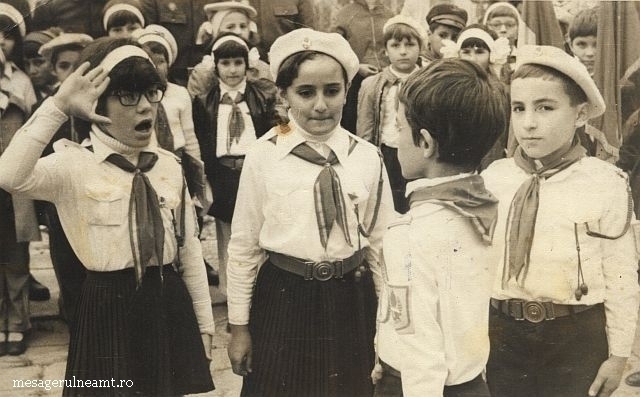“The Ever Forward!” Generation
People thought history was the faithful preserver of memory and when they turned it into an academic discipline they indulged themselves in the belief that history would be the very place where truth was about to be found.

Steliu Lambru, 14.11.2016, 13:48
However, the philosophy of history tells us that history, memory and truth are nothing but fragments of what belonged to the individual and the community. And the nostalgia that sometimes seizes us sends us to a past which, more often than not, we try to trim into something more beautiful, unpleasant as it may have been.
The memory of Communism is still something difficult to take responsibility for and its brunt is still hard to bear, although nostalgia has somehow rendered it more human. After decades of communist regime, and after other decades when research studies exposed Communisms fateful errors, it was nostalgia that had people come to terms with Communism and its blamable acts. “The Ever Forward generation is the generation of those who were children in the 1970s and the 1980s and who now make up Romanias mature generation.
This generation is also the generation of the decree children, of the children who were born as a result of Decree no. 770 of 1966, which officially banned abortion. Named after the pioneers slogan, “Ever Forward, this generation has now reached the age of nostalgia. Let it be mentioned that people with this kind of nostalgia no longer pine for the communist regime, but for the age that defined them as nostalgic.
In the 1990, “the Ever Forward generation viewed the nostalgia of the elderly with a mix of revolt and indifference. However, as years had gone by, “the Ever Forward generation was in turn seized by nostalgia, playfully at first, deeper and deeper afterwards. Historians Simona Preda and Valeriu Antonovici interviewed 22 personalities on their childhood in the communist regime, when, to a certain extent, parents did not have to worry about their children. A volume was the outcome of that, entitled “Ever Forward! Memories of Childhood, as well as a documentary film.
Simona Preda spoke about the exercise she did jointly with the interviewees as about an act of common introspection, which is not deprived of the traps of distorted perception: What is the difficulty when you speak about childhood? It may seem something of the ordinary, but it is very hard to speak about your own childhood. It is all the more difficult when you find yourself in front of the camera. It is very hard for you to find your bearings, to update yourself, to yet again find yourself in a time which, after so long, you may run the risk of blemishing its memories with an ideological grid you identified as such, much later, after many, many years. The moment you had to deal with adults, when you were exposed to talks, research studies, ideological influences, youre likely to run the risk of placing yourself ‘a posteriori towards things that sometimes you used to experience in a particular manner, things you used to feel in a certain way or things you enjoyed in a specific manner, when you were a child. The main trap for us, when we deal with memoirs and memories, is that belated relation which is eventually contaminated by maturity. Accordingly, memoirs and oral history studies will always be affected by the passage of time. Generally, when we bring history into discussion, even when we bring our own individuality into discussion, we actually deal only with interpretations. We can no longer recapture reality or us, just as we were, with good or bad, with sensational things or which only seemed sensational to us, at the time, no matter how much we would have liked to do that.
The nostalgia for childhood in Communism is easier to understand than other types of nostalgia, because its about the age of innocence, the age at which the world around is good, pure, beautiful, and you are surrounded by affection and attention. That is why the entire arsenal of objections, situations, life facts from that childhood, though ideologized at the maximum, is perceived with benevolence. The quasi-military structure of the pioneers organizations, the red flag, the slogans, the school uniforms, text-books, the entire universe of a 1970-1980 child, though representing a life style in a political regime that deeply humiliated its citizens, are treated with mercy and tolerance.
Just like all those who have recollected their communist childhood, Simona Preda knows that those times must never come back again, but people cannot forget: “There is this possibility of recovering, to a certain extent, what we liked or what we would have liked to have. Or to recover ourselves as we would have liked to be. And its all about the passing of time. I believe that the protagonists were sincere, and there are moments when you can actually feel that honesty breaking through the screen. There are moments when we ask questions about certain aspects relating to our past. I dont believe that we can give diagnostics or perform sociological assessments after several dozens of interviews. We could not do that after three, thirty, three hundred, three million or 23 million, as the population was at one time. Each and every one of us lived their own childhood, lived their own moments of nostalgia, of greatness or humiliation, and I dont think we can draw up standard prescriptions. As somebody once said, I did not spend my childhood in Communism, I spent my childhood during my childhood.
The “Ever Forward generation is the generation that had the historic chance to get rid of the most oppressive regime in history. Its the generation that turned Romania into what it is today, the generation that, despite third-age nostalgias, still has a say in what is happening.





























